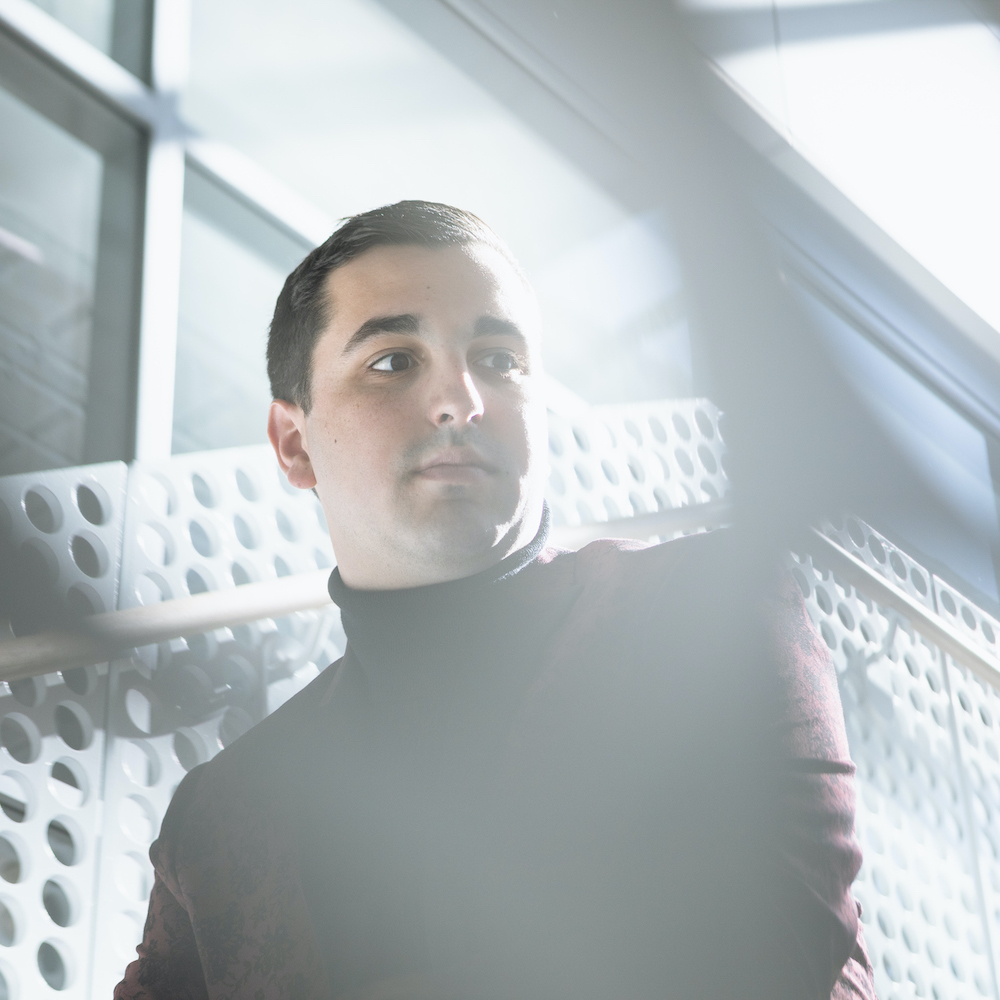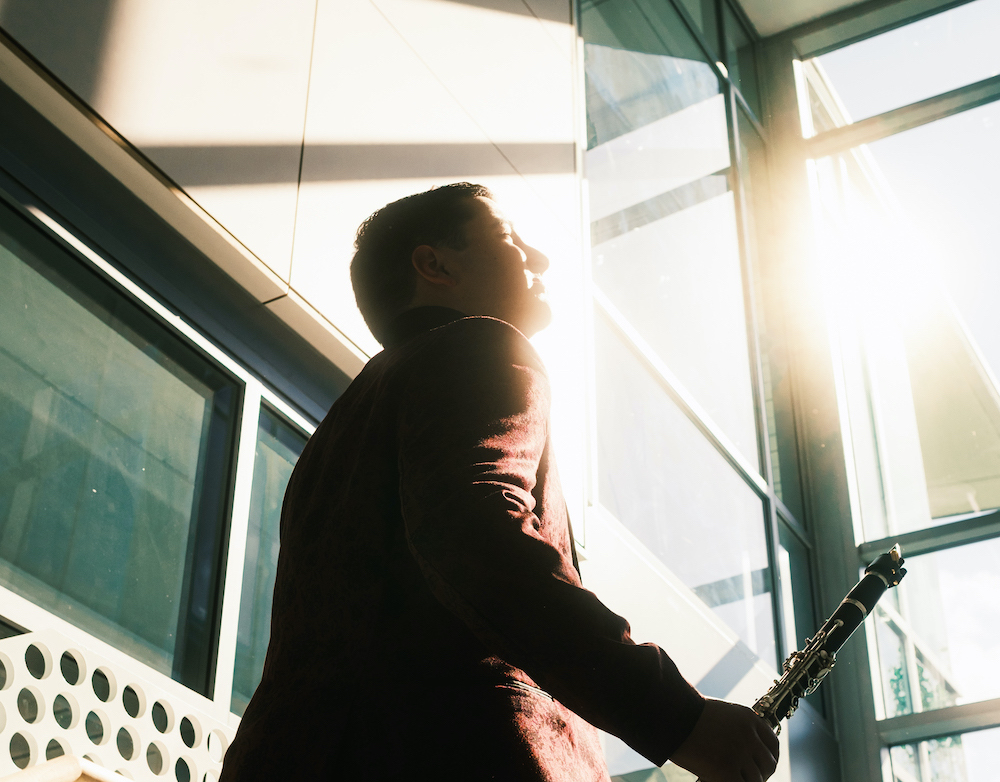2021 Krannert Debut Artist and Masters student in Clarinet Performance Andrew Buckley is hoping to change the way that classical music is experienced. Throughout his musical journey, Buckley has seen first-hand how classical music has stayed in a similar routine — music from the same old composers, lack of audience interaction, and a barrier between the performers and concert-goers.
Buckley is hoping to shake that routine up by bringing a younger voice into the classical music world. His new album Where We Go Next is scheduled to release in May. The album features all compositions from musicians of Buckley’s generation. While the album is set to drop in May, Buckley will be performing the music in front of an audience for the first time at 7:30 p.m. on April 28th at the Music Building Auditorium. The event is free and open to the public.
I chatted with Buckley over Zoom to discuss the importance of bringing a younger voice into classical, as well as his new album.
Smile Politely: Can you tell me a little about yourself? What was your musical background growing up?
Andrew Buckley: I’m originally from Rochester, New York — grew up there, went through high school there. I did not grow up in a musical family, but came up through a very strong music education system and studied with some really great mentors and teachers. From that point on I realized that I wanted to do music as my career, specifically classical music, thinking I wanted to be a Broadway woodwind doubler.
In my undergrad I was a music education major on the books, but also studying saxophone, clarinet, and flute in order to round myself out as a woodwind doubler. I went through that degree and as I was getting later into that degree, I realized that I wanted to narrow my focus a little bit. I was not getting where I wanted to be on one particular instrument, so I narrowed down to the clarinet. I wanted to do that, not on Broadway, but more in the orchestral and chamber music vein of classical. So I auditioned for masters programs and ended up here at the U of I to do my masters in clarinet performance and literature.

Image by Yuge Ji Photography.
SP: You were named the 2021 Krannert Debut Artist. What does that mean, and what did it mean to you?
Buckley: What it was when I went through it under the veil of the pandemic was that the faculty of the school of music recommends students that they think are worthy of the award to the school and to Krannert Center. So I was recommended by both of my professors, and then they take all of those recommendations and then you get to the actual performance round.
During the pandemic, we couldn’t do it live in front of a panel of judges. They had us play to a recording video camera, and we had a setlist of music that we decided on. We played about a 15 minute excerpt out of an hour-ish of music. Then it was a few weeks until the decision came out. The tricky part was from the time where they told us “you’re playing in the final round” to the final round itself was probably 24 hours. We had no time to turn this thing around, you had to get your excerpts ready in 24 hours. I remember it was a very late night in the practice room.
So I play the thing, and then a couple of weeks later the announcement comes out and I had professors and friends emailing and texting me congratulations before I even saw the email. I was like “what?” and then I checked the email and was like “holy crap, there it is!” It was exhilarating, it was really great to feel like the work I had been putting in throughout the pandemic paid off. It was also like, okay, all of the things I believe in, in terms of playing clarinet and expression and musicality — somebody admires that.
SP: One thing I was really interested in talking with you about was your new album, Where We Go Next. You mention wanting to inject a younger voice into classical music. That was always something I noticed in my time in orchestra, we were always playing the same composers and it got a little boring, it was unrelatable. You want something new after a while. Can you tell me a bit about the new album and where that goal of bringing in young voices came from?
Buckley: The driving force behind it was, I have this award from Krannert and I had to do something with it, what do I do? My gut reaction is to take my four or five favorite pieces of clarinet repertoire and record it. The thing is, those pieces have already been recorded by some of the best players in the world, and those are the definitive recordings, I’ll never top those – well, maybe I will, but right now I’m not going to. So in terms of driving my career forward and doing something impactful, that wasn’t going to do it.
Right about this time I was having meetings with the music business professor at Juilliard, Bärli Nugent, and she made a suggestion to commission works from musicians and composers of my generation, and record them and push them out into the world. So I kind of took that and ran with it. The composers I settled on for this project are all of my generation, all of them were recommended to me. I reached out to some faculty at U of I, as well as my undergrad alma mater and asked for composers.
So we had four composers write four pieces, three of which are for clarinet and piano, and the fourth is for my trio, The Goodwin Avenue trio — cello, clarinet, and piano. The goal is really just to take the voice of our generation of musicians, both from the compositional and performance end of things, and put a product out into the world that says “this is who we are, this what we have to say.”
SP: So going back to live performances, I read that you prefer audience interaction during performances. How does that show up in action during a classical performance?
Buckley: Yeah it’s hard to sum up because we are still trying to get back to doing that after coming out of the pandemic when we didn’t have audiences. Traditionally when you go to a classical concert, you go and you sit down, you get a program, all the information about all of the music is in the program. The conductor walks out, they conduct a piece, they walk off and nothing is said, you know? So there’s this glass wall between the audience and the stage and the musicians — it’s almost like a museum.
So I try to flip that and do the opposite, and try to speak to the audience, whether that’s giving oral program notes, or information about why I picked the pieces, my connection to them — I think if you share those experiences it makes the performance a lot more powerful because the audience then understands where you’re coming from and where your expression has come from. I hope it makes the audience feel like there’s an actual person — a living, breathing person with life experiences standing up there, not just a robot who’s been trained to play.
SP: Yeah and in the audience you feel like, oh you have to be quiet and if you make a sound everyone is like “shut up shut up!”
Buckley: Yeah! That’s what I’m talking about. It’s not how this thing started. If you look back at concerts from the late Baroque period, concerts were social events — social music for people to mingle. People could leave concerts and come back when they wanted. There would be food and drinks and everything. Now it’s just kind of like, come sit down, shut up and listen.

Poster by Yuge Ji Photography.
SP: Audience interaction paired with the younger voice of composers — I think audiences do want something new. I don’t know if they really realize it yet, but I think they do.
Buckley: The turnover is happening. Orchestras are trying to pull in younger crowds to get them interested in classical music, but they can’t do that with the old stuff, the old repertoire — they can sprinkle it in, but it can’t be all that. That’s where the younger, youthful music maybe represents a little bit of the culture of that younger generation.
SP: Do you feel like social media is playing into the rising interest in classical music?
Buckley: Yes. The pandemic actually “helped” this in a lot of ways where orchestras and chamber music groups had to move their content online — you present it online in order to stay afloat. We were all doing Facebook live stream recitals, Vimeo, TikTok, Instagram lives, we were all doing it. Just to put some content out there when we couldn’t have live audiences — and that has now just kind of stayed. I don’t really know any orchestra that has gone away from broadcasting their stuff online. They’re doing it in addition to in-person programs.
So that is going to pull in a younger audience because, maybe a younger person can’t get to Chicago to see the symphony, but they can pay to see it online, and they’d much rather pay to watch it at home with a beer and bucket of popcorn.
SP: Plus, if there is an orchestra in another city who is playing the more exciting stuff that your local orchestra isn’t playing, it’s like, “oh I can just watch them online instead of driving miles to see them.”
Buckley: Yeah, you can see what you want to see.
SP: Where can people keep up with you?
Buckley: All of my social media handles, and my website. So stay tuned there, any updates will be coming through on those.
You can follow Andrew Buckley on Facebook, Instagram, and check out his website here. You can also add his upcoming album release concert to your calendar here.








